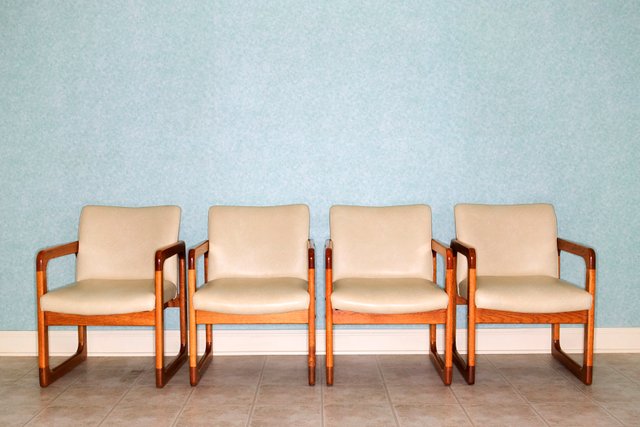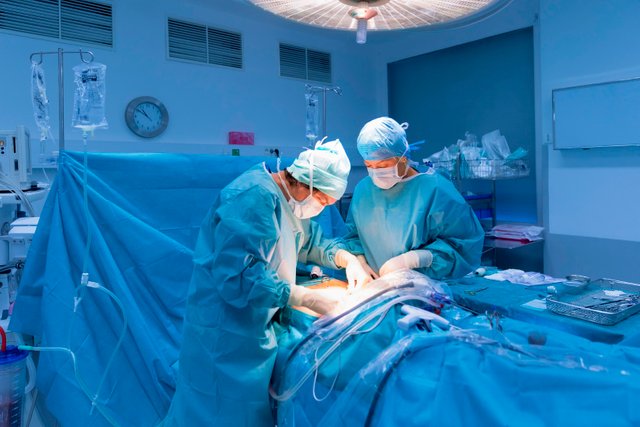Mind-Body Connection: Anxiety/Depression Increase Wound Complications After Surgery

Introduction
More and more evidence is accumulating about the mind/body relationship as it comes to general health.
A number of small studies have suggested impaired wound healing as a result of anxiety/depression.
This is important because it could present an additional surgical risk factor with both cost and long term health implications.
A new study in the British Journal of Surgery [1] takes a look at this issue on a much larger scale than previous studies.
It also looks at evaluating and reducing the influence of potential confounding factors present in previous research.
As always there is a TLDR summary in the "Conclusions" - scroll down if you are pushed for time or not interested in the details.
Methods and Discussion

Four Operation Types Were Examined
The study was carried out in England on patients undergoing four of the most common surgeries:
- Hip replacement.
- Knee replacement.
- Inguinal hernia repair.
- Varicose vein surgery.
PROM Questionnaires Combined With HES
Since 2009 patients routinely fill in a PROM (Patient Reported Outcome Measures) questionnaire both just before they undergo surgery and 3-6 months after surgery.
PROM data was linked with hospital data called HES which has detailed statistical/demographic information on patients.
This makes sense. It gives a very large sample size to use and gives data for the most common procedures.
The main problem with these sorts of questionnaires is that since they are patient filled there are often issues with patients filling them incorrectly, not at all, or leaving bits of information out.
Further the two part design means that there are likely to be a lot of dropouts.
There is also the possibility of selection bias in the form of people who have more problems may be more likely to respond.
Also people who are more anxious may be more likely to report problems too.
Three Measures of Psychological Health Were Used
- Previous diagnosis (reported by the patient).
- Self reporting of anxiety/depression using a simple multidimensional scale called EQ-5D.
- Hospital recorded anxiety/depression.
I actually think that this is a fairly robust way of estimating mental health issues.
Whilst ideally one would want each and every patient to have a full psychiatric evaluation that is not feasible.
I think this combination approach gives three different ways of tackling the problem.

Wound Related Measures That Were Used
- Patient Reported in the PROM questionnaire.
- Hospital Reported (during initial stay).
- Wound related readmission - hospital reported.
The use of the PROM questionnaire for wounds is useful as everyone should receive it postoperatively.
That does not mean that they do though!
Some people may not produce a complete initial questionnaire (if at all). Many people who filled in the first one will not fill in the second post-op questionnaire.
There is great potential for people and data to be lost this way which could skew the results.
Hospital reports may be more accurate but in relation to point 2 they are less applicable as most wound healing occurs outside of hospital.
People stay in hospital for as short a time as possible these days - with good reason, it is better for you!
Point 3 is a much more specific measure as you are unlikely to be readmitted with a wound problem unless there actually is quite a serious wound problem.
That is also it's weakness though because it will miss less severe problems so what it has in specificity it lacks in sensitivity.
The hope here is that the combination here will give a greater overall picture than any one single measure on it's own.
Sadly in medical research, because we are dealing with people we often have to work around these sorts of issues.

Confounding Factors
Statistical analysis was used try to reduce the effect of several potential confounding factors e.g. sex, age and income.
These could have an effect on the results so it is important to reduce their effect though not possible to remove them completely.
Final Sample
The final sample after excluding incomplete, unfilled PROM questionnaires and drop-outs was 176,827.
This is a nice big sample size and broke down as follows:
- 59410 hip replacements.
- 64145 knee replacements.
- 38328 hernia repairs.
- 14944 varicose vein operations.
Despite the size we must still consider if the dropouts skewed the results.
The data did not state the total (raw) starting figure vs this final figure (unless I have missed it).
This information would be useful to consider.
Results

There are a lot of results here and the way they are displayed is not very easy to follow in the tables used in the paper.
To keep things as brief as possible I will only cover the most important results (in my opinion).
I have therefore made my own tables with the most relevant information:
TABLE 1 ODDS RATIO (OR) of Hospital Readmission For Complications in the Presence of Depression/Anxiety
| Wound Readmission | |
|---|---|
| Previous Diagnosis | 1.37 |
| Self Moderate | 1.20 |
| Self Extreme | 1.30 |
| Hospital Recorded | 1.08 |
| Mean | 1.24 |
TABLE 2 ODDS RATIO (OR) of Developing Wound Complications in the Presence of Depression/Anxiety by Operation
| Hip R | Knee R | I. Hernia | V. Veins | |
|---|---|---|---|---|
| Previous Diagnosis | 1.36 | 1.28 | 1.34 | 1.27 |
| Self Moderate | 1.17 | 1.13 | 1.20 | 1.21 |
| Self Extreme | 1.26 | 1.27 | 1.66 | 1.68 |
| Hospital Recorded | 1.32 | 1.24 | 1.29 | 1.13 |
Quick Explanation of Tables
These are the final "adjusted" odds ratios and are broken down into each means of reporting of depression/anxiety.
"Adjusted" means that they have undergone statistical adjustment to reduce the effect of confounding variables.
An OR greater than 1 shows an increase in risk, OR equal to 1 would show no increase in risk, an OR of less than 1 would show a decreased risk.

Standout Finding
There is a lot of information here and I will only cover the standout finding (in my opinion).
For me it is that people who are previously diagnosed with depression have an odds ratio of 1.37 for a wound complication requiring readmission.
This means that people with diagnosed depression are at 37% greater risk for readmission to hospital with wound complications.
The reason this stands out for me is that one would assume a formal diagnosis is more accurate for depression.
Similarly one would assume that a hospital admission for a wound complication is also more likely to indicate an actual wound issue compared to pure self reporting.
Inconsistencies
There also seem to be significant differences between different diagnostic methods which I think are prominent in both Table 1 and 2.
One might assume something like this for different diagnostic methods but I find the results in table 2 more inconsistent and puzzling.
For example hospital recorded depression has a significantly lower OR at 1.13 for varicose vein surgery, versus an OR of 1.68 for people self reporting.
To be honest I'm not sure why there would be such a big difference.
I'm wondering if this is due to some kind of problem with reducing the effect of confounding factors in these particular subgroups?
Alternatively could there be some misreporting or incomplete reporting of previous diagnoses? Why would the effect be so great?
Why Would Depression/Anxiety Increase Wound Complications

This isn't really directly discussed in the paper and to be honest is not really the aim of this study.
The first step is to establish increased risk.
Elucidating factors which increase the risk would be more appropriate for later research.
It is worth discussing though.
Here are some potential reasons I can think of:
Physiological and pathological differences in depression, such as higher levels of cortisol (a stress hormone) and the direct effect on the immune system/ wound healing.
Lifestyle Differences - perhaps depressed people go out less, have worse diets, exercise less. All these things could have an impact.
Direct Behavioural Differences - these will overlap with lifestyle but maybe depressed/anxious patients are less aware of and look after their wounds less well compared to regular patients.
Medication - prescribed (or unprescribed) psychiatric medication may be having a variety of effects on the healing process. There may also be other effects such as greater need for painkillers in depressed/anxious individuals which may also have effects.
Although one could say the way this study was designed aimed to narrow down the differences that are due to point 1, I think it would be very naive to assume it would.
Further unless I have missed it I didn't really see any discussion of point 4 - i.e. medication.
Conclusion and TLDR

Anxiety or depression significantly increases the risk of wound complications after surgery for all four common surgical procedures that were looked at.
Overall people with a diagnosis of depression are 37% more likely to be readmitted with wound related complications compared to those without depression.
There does seem to be some variability of risk associated with different diagnostic measures for depression/anxiety as it applies to different operative groups and this does not seem to follow a consistent pattern.
This may hint at some underlying methodological issues which need further investigation to confirm these findings.
Further research should help to clarify some of these issues as well as looking at the actual underlying mechanisms for the increased risk.
References
- Britteon, P., N. Cullum, and M. Sutton. 2017. “Association between Psychological Health and Wound Complications after Surgery.” The British Journal of Surgery, February. doi:10.1002/bjs.10474.
Thank you for reading

Before you go have you filled in the Coinbase form to list STEEM? It only takes a few seconds. THIS POST shows you how.
If you like my work please follow me and check out my blog - @thecryptofiend
Uncredited Images are taken from my personal Thinkstock Photography account. More information can be provided on request.
Are you new to Steemit and Looking for Answers? - Try:

I like your post keep up the good work..can you follow me..thank you
Thanks. Since you asked so nicely I will try but it is hard for me to keep up with my feed I am following so many people!
i think you are one of the best writers on steemit, would like to see you trending more
That is very kind of you:)
The brain is the most important organ in our body! We can control our health with our thoughts!
Yes:)
I think my personal experience in life would leads me to believe this to be true.
I think the phrase, "laughter is the best medicine" is more poweful than we realise.
Stress creates the conditions in the body for disease and other problems to emerge, and whilst the body is busy combating these arising issues provoked by a spike of cortisol in the system, it is understandable that it wouldn't have the opportunity to attend to the healing of wounds efficiently.
I have seen how those who suffer from severe stress tend to be riddled with health conditions, and those who have a much more stress-free perspective seldom suffer the same problems.
If we could all learn to be a bit more positive I think it would be reflected in our health.
Yes for sure. Sadly it is hard to get people to slow down and enjoy themselves in order to be more positive.
This is really interesting.
It would be cool to do an experiment to see if people heal faster when they are happy.
So we would need to inflict a (small) wound on someone and see how long it takes to heal.
Then do the same thing but alter their mental state and see how long the healing process takes.
I'd be up for that. :-)
My hypothesis is that in a happier state the wound heals faster - or - it seems to heal faster to the patient.
My biggest problem with studies like this, is that the stats can say whatever you want them to say.
I'd really like to see practical studies done to find out
1 - does being happier equal healing faster with less complications?
2 - can we induce that mental state to increase healing outcomes?
Good luck getting ethics approval for the study however ;-)
That would be a tough one to get approved as you say! I think it is easier to look at people who are being wounded for a reason i.e. surgery and maybe get them to watch comedy videos vs documentaries (serious ones not feelgood ones) - as long as it is not abdominal surgery or jaw surgery obviously.
It's an interesting question for sure.
But more interesting is why are you awake at this hour!?
It must be something like 3am over there.
Get some sleep! :-)
No it is 1 am but I am going to go to bed shortly :)
Well make sure you do. We can't have doctors being tired you know. It affects their health and well being. :-)
And we need you to be well, to keep us well.
I will be more sensible once I am back at work lol probably!
Sorry! REALLY SORRY! Great post.
NP glad you liked it!
!cheetah unban
What the hell was this all about?
Your post caught my attention and I read it. I was going to comment but decided you answered my question.
I messed up and didn't pay close enough attention when I was switching back to another tab. I'm rounding up a group of scammers. I really am sorry.
I just got worried in case someone was impersonating me because that has massive connotations if you are a doctor!
Wonderful post @thecryptofiend I can totally relate to your great information upvoted resteemed
Thank you:)